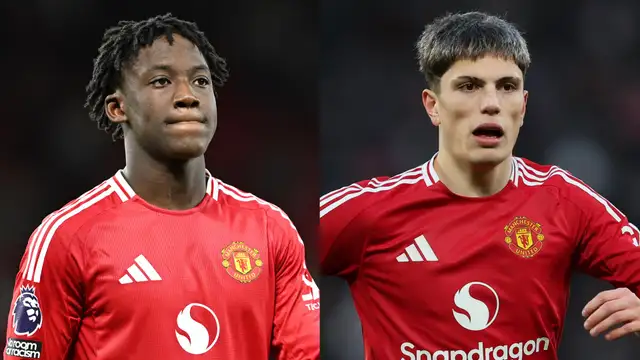
Manchester United: The Dilemma of Selling Kobbie Mainoo and Alejandro Garnacho Amid Financial Pressures
Manchester United finds itself at a crossroads, grappling with the prospect of selling two of its most promising young talents—Kobbie Mainoo and Alejandro Garnacho. The potential departure of these academy stars is reportedly under consideration as the club looks to balance its financial books in response to Financial Fair Play (FFP) constraints and mounting Premier League sustainability rules (PSR) scrutiny. With valuations placing their combined worth at an impressive £70 million, this scenario raises several pressing questions about the club’s direction, priorities, and long-term strategy.
Background: The Financial Tightrope
For a club of Manchester United’s stature, balancing footballing ambitions with financial obligations is a delicate act. Despite being one of the most profitable sports organizations globally, United’s hefty wage bill, transfer splurges, and underwhelming recent success on the pitch have left the club vulnerable to regulatory oversight.
The Premier League’s PSR framework, which focuses on limiting financial losses and encouraging clubs to operate sustainably, has added pressure on United’s management to cut costs and generate revenue. While this isn’t new territory for elite clubs, United’s dependence on its academy pipeline for both first-team reinforcements and financial relief has come into sharp focus.
Kobbie Mainoo and Alejandro Garnacho—two bright sparks from the club’s youth system—have risen to prominence, embodying the legacy of the famed Class of ’92. But now, they’re viewed as potential assets to liquidate in the name of financial stability.
The Rising Stars
Kobbie Mainoo
Mainoo, an 18-year-old midfielder, has garnered plaudits for his composure, tactical awareness, and passing range. Comparisons to Michael Carrick and Paul Pogba highlight his blend of positional intelligence and physical presence. Having already made his senior debut, Mainoo’s stock is on the rise, and many see him as a cornerstone of United’s midfield for years to come. However, interest from rival clubs has seen his market value soar, potentially making him a lucrative sale in the short term.
Alejandro Garnacho
Garnacho, a dynamic winger, has become a fan favorite for his fearless attacking play and knack for producing decisive moments. The 19-year-old Argentine has already made significant contributions to United’s first team, with crucial goals and assists in key games. His flair, speed, and technical ability make him one of the most exciting prospects in world football. Garnacho’s commercial appeal also adds to his value, with a reported price tag of over £40 million.
Why Selling Would Hurt
United’s academy has long been a symbol of the club’s identity. The success of players like Marcus Rashford, Scott McTominay, and others reinforces the importance of nurturing homegrown talent. Selling Mainoo and Garnacho would represent a short-term financial gain but could undermine the club’s future.
Loss of Potential
Both players have the attributes to become integral to the first team. Selling them now would mean losing out on their peak years, which could save the club millions in future transfer fees while maintaining on-field quality.
Fan Backlash
The prospect of selling academy stars has historically been met with resistance from the fanbase. United supporters, already critical of the Glazers’ ownership, may view this move as further evidence of mismanagement.
Competitive Impact
Letting Mainoo and Garnacho go could strengthen rival clubs. In a league as competitive as the Premier League, allowing young talent to flourish elsewhere is a risk United can ill afford.
The Case for Selling
While painful, there are arguments in favor of cashing in on Mainoo and Garnacho:
Financial Relief
United’s reported £70 million valuation of the duo would provide a significant boost to the club’s coffers, easing PSR compliance pressures and potentially funding other areas of need.
Immediate Needs
United’s squad has glaring deficiencies, particularly in defense and midfield depth. The funds from these sales could be reinvested in experienced players who can make an instant impact.
Risk Management
Young players, no matter how talented, come with an element of unpredictability. Selling now ensures a guaranteed financial return, avoiding the risk of stagnation or injuries derailing their development.
What Should United Do?
Manchester United faces a challenging decision that will test its leadership and values. The sale of Mainoo and Garnacho could provide much-needed financial breathing room but at the expense of long-term potential and fan trust.
Alternative Solutions
Instead of selling their prized assets, United could explore other avenues to address their financial challenges:
- Offloading Fringe Players: The squad has several high-earning players who contribute little to the first team. Prioritizing their sale could generate funds without sacrificing core talent.
- Commercial Growth: United’s global fanbase remains a major asset. Expanding commercial partnerships and sponsorship deals could help offset financial pressures.
- Youth Loan System: Rather than selling, loaning out Mainoo and Garnacho to gain experience while retaining their long-term services might be a compromise that satisfies all parties.
Conclusion
The potential sale of Kobbie Mainoo and Alejandro Garnacho highlights the complexities of modern football management. While financial realities cannot be ignored, Manchester United’s identity is rooted in its faith in youth and long-term vision. A hasty decision to sell these academy gems may provide a temporary fix but could have lasting consequences for the club’s on-field performance and relationship with its fans.
Ultimately, United must tread carefully, balancing immediate needs with their enduring legacy as a club that champions young talent. Whether through creative financial management or a recommitment to academy development, the decision made in this instance will speak volumes about the direction of Manchester United under its current leadership.
Leave a Reply